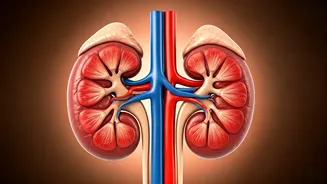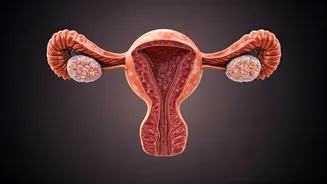Skipping Breakfast Risks
Skipping breakfast poses a significant threat to kidney health. This habit can strain kidney function over the long term. When you don't eat in the morning,
your body may turn to other sources for energy. This can lead to increased stress on your kidneys, potentially increasing the risk of kidney-related problems. Ensure your kidneys remain healthy, and incorporate a balanced breakfast into your daily life. Regularly eating a nutritious breakfast is an important step towards better kidney health and overall well-being. It provides the energy and nutrients needed to kickstart your day and support your kidney function, which helps to maintain the body’s health.
Morning Hydration Matters
Not drinking water in the morning can negatively affect kidney health. During sleep, your body becomes dehydrated. When you don't hydrate in the morning, your kidneys face difficulties functioning properly. Dehydration can increase the concentration of waste products in your kidneys, potentially leading to damage. The kidneys are vital for filtering waste and maintaining fluid balance in the body, and hydration plays a key role in supporting this process. Making an effort to drink water first thing in the morning is a simple yet very important way to support the health of your kidneys. Drinking water regularly keeps the kidneys functioning correctly.
Painkiller on Empty Stomach
Taking painkillers on an empty stomach presents a hidden risk to kidney health. Painkillers, especially nonsteroidal anti-inflammatory drugs (NSAIDs), can be harsh on the kidneys, especially when consumed without food. When painkillers are taken on an empty stomach, the kidneys are exposed to a concentrated dose of the medication. This can lead to decreased blood flow to the kidneys, increasing the risk of kidney damage. Always take pain relievers with food and consult with a doctor or health expert, especially if you have a history of kidney problems or are taking multiple medications. It’s always best to be cautious with medications.
Inadequate Hydration Post-Exercise
Failing to rehydrate after exercise affects kidney function over time. When you exercise, you lose fluids through sweat. Not replenishing those fluids adequately puts a strain on your kidneys. Dehydration caused by exercise can lead to decreased blood flow to the kidneys and increase the concentration of waste products. Drinking water after exercise is necessary for flushing out the harmful wastes from the body. It helps to keep the kidneys functioning at their peak. It is essential to replenish fluids, especially after exercise to make sure your kidneys stay healthy and continue to function effectively. Water alone is often not enough and electrolytes should also be considered.
Additional Harmful Habits
The article's experts identify some more habits that can cause long-term harm to your kidneys. Besides the ones already mentioned, other routines can contribute to kidney damage. These include inadequate sleep and excessive consumption of processed foods high in salt. Poor sleep can disrupt the body's natural processes, affecting kidney function. Consuming excessive salt can cause high blood pressure, which is a major risk factor for kidney disease. By addressing these morning habits, you can take control of your kidney health. It is essential to consult with healthcare professionals to get personalized advice.













